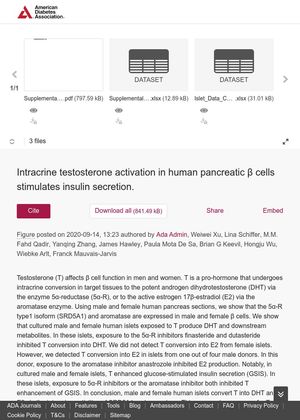TLDR Testosterone in our bodies helps increase insulin secretion from the pancreas.
The study from 2020 demonstrated that testosterone (T) affects β cell function in both men and women. The researchers found that T undergoes intracrine conversion in target tissues to dihydrotestosterone (DHT) via the enzyme 5α-reductase (5α-R), or to the active estrogen 17β-estradiol (E2) via the aromatase enzyme. This process was observed in both male and female human pancreas sections. The study also showed that exposure to 5α-R inhibitors or the aromatase inhibitor inhibited T enhancement of glucose-stimulated insulin secretion (GSIS). The conclusion was that male and female human islets convert T into DHT and E2 via the intracrine activities of SRD5A1 and aromatase, and this process is necessary for T enhancement of GSIS.
 237 citations
,
December 2001 in “Urology”
237 citations
,
December 2001 in “Urology” Blocking the enzyme 5α-reductase can shrink the prostate and help treat enlarged prostate issues.
 5 citations
,
January 2001 in “Advances in protein chemistry”
5 citations
,
January 2001 in “Advances in protein chemistry” 5α-reductase inhibitors help treat disorders caused by DHT and have potential for future therapies.
 32 citations
,
April 1999 in “Expert Opinion on Investigational Drugs”
32 citations
,
April 1999 in “Expert Opinion on Investigational Drugs” Finasteride effectively treats male hair loss, improving growth and density.
 5 citations
,
January 2017 in “Endocrinology”
5 citations
,
January 2017 in “Endocrinology” Genetic defects in testosterone production can cause hormonal and developmental disorders, and more research is needed to understand androgen regulation and develop safer treatments.
 49 citations
,
January 2004 in “Journal of steroid biochemistry and molecular biology/The Journal of steroid biochemistry and molecular biology”
49 citations
,
January 2004 in “Journal of steroid biochemistry and molecular biology/The Journal of steroid biochemistry and molecular biology” Selective non-steroidal inhibitors of 5α-reductase type 1 can help treat DHT-related disorders.
 11 citations
,
January 2000 in “The Journal of Steroid Biochemistry and Molecular Biology”
11 citations
,
January 2000 in “The Journal of Steroid Biochemistry and Molecular Biology” LY320236 is a strong blocker of two enzymes that change testosterone into dihydrotestosterone and might help treat conditions related to male hormones.







